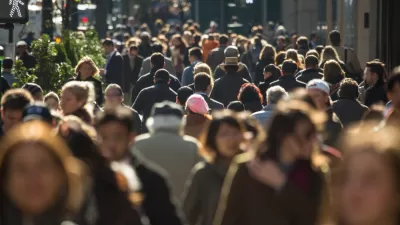Fundamentally, we are at a critical turning point in terms of how we think about data and how we use data for governments and cities as well as businesses and other institutions.
Susan Etlinger, an analyst for the Altimeter group, TED speaker and Big Data guru, gave a much darker view of A.I. and Big Data in an interview to Cities of the Future, during the Smart Cities World Congress in Barcelona.

She talked about recent U.S. presidential elections and the use of Big Data and surveillance:
"[...]suddenly we’ve gone from a government where we had an understanding, a general understanding, particularly after Snowden, of how data was used, to big questions,” she said. “Fundamentally, we are at a critical turning point in terms of how we think about data, and how we use data both for governments and cities, and also for businesses and other institutions.”
"There is this sort of assumption that mathematics is inherently neutral. And, in the world of data science, nothing can be further from the truth," she says.
Because of that: “Obviously the US news media, as an example, is full of conspiracy theories right now. The reality is [AI] is an incredibly powerful technology, even more because it is very difficult, and in some cases impossible, to go back and understand exactly what happens in an algorithm, and AI.[...] It could be potentially a very scary time. Some people in the US are talking about ‘living in a post-facts society.’ That is a real danger.”
FULL STORY: Susan Etlinger: We are at a critical turning point about data

Manufactured Crisis: Losing the Nation’s Largest Source of Unsubsidized Affordable Housing
Manufactured housing communities have long been an affordable housing option for millions of people living in the U.S., but that affordability is disappearing rapidly. How did we get here?

Americans May Be Stuck — But Why?
Americans are moving a lot less than they once did, and that is a problem. While Yoni Applebaum, in his highly-publicized article Stuck, gets the reasons badly wrong, it's still important to ask: why are we moving so much less than before?

Using Old Oil and Gas Wells for Green Energy Storage
Penn State researchers have found that repurposing abandoned oil and gas wells for geothermal-assisted compressed-air energy storage can boost efficiency, reduce environmental risks, and support clean energy and job transitions.

Greening Oakland’s School Grounds
With help from community partners like the Trust for Public Land, Oakland Unified School District is turning barren, asphalt-covered schoolyards into vibrant, green spaces that support outdoor learning, play, and student well-being.

California Governor Suspends CEQA Reviews for Utilities in Fire Areas
Utility restoration efforts in areas affected by the January wildfires in Los Angeles will be exempt from environmental regulations to speed up the rebuilding of essential infrastructure.

Native American Communities Prepare to Lead on Environmental Stewardship
In the face of federal threats to public lands and conservation efforts, indigenous groups continue to model nature-centered conservation efforts.
Urban Design for Planners 1: Software Tools
This six-course series explores essential urban design concepts using open source software and equips planners with the tools they need to participate fully in the urban design process.
Planning for Universal Design
Learn the tools for implementing Universal Design in planning regulations.
Heyer Gruel & Associates PA
City of Moreno Valley
Institute for Housing and Urban Development Studies (IHS)
City of Grandview
Harvard GSD Executive Education
Salt Lake City
NYU Wagner Graduate School of Public Service
City of Cambridge, Maryland




























